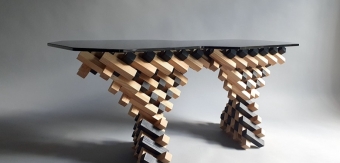by Magnus Shaw
Special K eternally pitched as a "healthy" food, it's now at the centre of an "eat this and wear smaller jeans" campaign. It must be going well, because a line of Special K snacks has been launched named "Cracker Crisps."
It's no secret that launching a new food product is an uphill slog. You're pitching into a very crowded market, with enormous levels of customer loyalty and a high failure rate. Persuading the consumer to switch to your latest grub takes patience, determination and a head-spinning marketing budget. Usually, the giants of food manufacturing don't worry too much about this, slinging money at a brand until it takes off. But these aren't usual times and even the wheaty lords of breakfast, Kellogg's, must watch the pennies. Perhaps that's why the firm has taken a rather unusual approach to the promotion of "Cracker Crisps."
Not all readers of Creativepool frequent Soho - me included. But if you do, you may have come across something called a Tweet Shop, operated by the "Special K" people. The shop is staffed by women dressed in the red of the Special K brand and this is how it works. You or I enter the Tweet Shop and help ourselves to a packet of delicious Cracker Crisps (actually, they may be revolting, I haven't tasted them). We need not pay money for our goods, all we owe is a review of the snack posted instantly on Twitter. This saves us 60p. Presumably Kellogg's figure they will gain from the free exposure and everyone wins. Except perhaps, Twitter.
Above all, Twitter is a massive conversation with thousands of topics and millions of participants, but a conversation nonetheless. That's the appeal of the service and it's important users know the conversation is authentic. We may vehemently disagree with the comments and opinions we follow, and relish the opportunity to respond, but the interaction collapses if users don't mean what they say.
Of course, Twitter is also available as an advertising platform - therein lies its business model - but usually, advertising messages are flagged up with a tag reading "Promoted." Kellogg's are seeking to subvert any off-putting warnings, buying their way into users' account and bribing them to tweet on the brand's behalf. In short, they're paying for authenticity. The question is, does that matter?
On the face of it, there's no reason a punter should not tweet about a product they've tried - even if that product was given to them. After all, their account hasn't been hacked and the tweet isn't spam (Tweeters will know there's a lot of pernicious spam swimming about on the platform), coming as it does from a genuine user and typed by their own hand. But take a look at the tweets people have posted on the subject of "Cracker Crisps". Despite one or two critical comments about the methods used, the vast majority of messages are glowing in their praise. Here's a few of them:
"I love Special K Cracker Crisps!!!" (plus picture)
"Mmmm Special K Cracker Crisps, I could eat a whole box and not that many calories"
"Thanks @KelloggsUK!"
You might imagine at least a handful of the many customers would find the snacks unappetising and would say so. But that hasn't been the case. Or at least, negative tweets aren't appearing. So are Kellogg's censoring comments which give "Cracker Crisps" the thumbs down? The Guardian asked them, this is what they said:
"Tweets are monitored before the Cracker Crisps are handed over. However, anyone can tweet a negative tweet and we cannot stop this."
Hmmm. That's a bit opaque. Obviously Kellogg's cannot block tweets, whatever they say. But they can refuse to hand over a free packet of crisps. If the consumer is at liberty to tweet anything they wish, why would the tweets require monitoring?
Then again, who cares if Kellogg's are dishing out snacks in return for tweets? It's just a clever bit of social marketing, right? Well, possibly. However, we cannot underestimate the power of Twitter. TV shows frequently include a hash tag in their opening credits. Dozens of daily news pieces quote Twitter reactions. Talk radio gauges public opinion by the site. When a medium has this sort of impact, it's important we're aware of the validity of the messages we read. If a group of people is being "employed" to tweet, then it should be clear what is going on. Crisps aren't particularly crucial, but lobbying, pressure group campaigning and political electioneering all matter a great deal. And, as we are increasingly influenced by social media, it's vital we know when we're reading an individual point of view and when we're being exposed to something more contrived and constructed.
Kellogg's are probably guilty of nothing more than a bit of subversive, if clunky, guerilla marketing. But if Twitter doesn't devise a way to distinguish between real conversations and paid-for activity, it will soon fall prey to darker forces than a cereal company.
Magnus Shaw is a copywriter, blogger and consultant.
www.magnusshaw.co.uk
"Advice" a collection of Magnus Shaw's columns is now available as a Kindle book.





